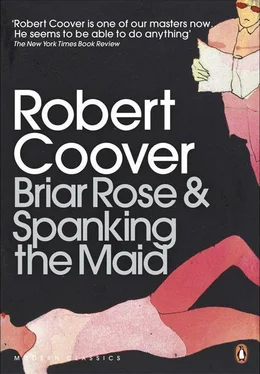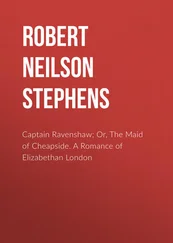She awakens to repeated awakenings as though trapped in some strange mechanism, and she longs now to bring it to a standstill, to put an end once and for all to all disquiet, even if it means to sleep again and sleep a dreamless sleep. And so she goes in search of an old crone who has befriended her, one she believes may have magical powers, or at least some useful pharmaceutical ones, and while looking for her she comes upon a door that is not a door. She knows, though she does not know how she knows, that beyond it there is a long dark corridor leading to a spiral staircase, at the top of which, in the highest tower of the castle, is a spinning room. Where something bad happened. Or will happen. But something perhaps that she desires. She steps through into the secret corridor and there discovers her true prince in all his manly radiance embracing a scullery maid. Oh, sorry, he says. But she was asleep and I was only trying to— She wants to scratch his eyes out, but he has already disappeared. She seems to hear galloping hooves, though it may be only the clattering of her unhappy heart. Perhaps he has abandoned her forever, returning to his ogress wife or riding off to new adventures. It is easy for him. She has no horse, could not steer it if she did, would not know where to take it if she could, this castle all she knows or dares to know. Such a ninny, as the old crone says. But his exuberance frightens her, his worldly heroics do. He is young enough to be her great-great-great grandson, yet he seems a hundred years older. Sometimes I think it was better when we was all asleep, mum, the maid says wistfully, hands cupped under her belly, swollen with child. I had such pretty dreams then. Yes, I know. She will have the girl’s throat slit tomorrow and serve her up to him when he returns, his unborn between her jaws like a baked apple, if tomorrow ever comes, but for now, feeling like an abandoned child, those who might protect her from the fairy’s curse gone off to their houses of duty or pleasure, she continues her lonely explorations, down the shadowy corridor and up the swaying spiral staircase, her eyes closed, hands crossed demurely on her breast, her silken gown disintegrating in the chill draft, lips parted slightly to receive what fate awaits her.
The bad fairy, who is also the good fairy, returning to the source as she so often does, finds her unhappy charge sprawled on the floor of the spinning room, clothed in little more than tangled flaxen strands and furiously stabbing herself over and over with the spindle. Ah, such a desire to sleep again, the fairy muses, reckoning the poor creature’s tormented thoughts. She could well change herself into a handsome prince and give her a consolatory kiss and a cuddle, but, in the state she is in, it might only provoke her into throwing her disembodied self down the stairwell, augmenting her confusion and despair. Will this spell never be broken? Rose wants to know. The warring sides of the fairy’s own nature clamor for attention: isn’t it time to dip into your necromantic bag of tricks for a little relief, you old bawd, a bit of allegorical hocus-pocus perhaps, that old scam? The good fairy’s boon to this child, newborn, was to arrange for her to expire before suffering the misery of the ever-after part of the human span, the wicked fairy in her, for the sake of her own entertainment, transforming that well-meant gift to death in life and life in death without surcease. And, in truth, she has been entertained, is entertained still. How else pass these tedious centuries? Once upon a time, she says with a curling smile, her wicked side as usual taking over, there was a handsome prince and a beautiful princess who lived happily ever after. But that’s terrible! cries Rose. No, no, wait, that’s just the beginning. But I hate this story! Happily ever after, admonishes the fairy, wagging a gnarled finger the color of pig iron. It may not be worth a parched fig, my daughter, but it hides the warts, so don’t be too quick to throw it out! You really are evil, Rose groans, continuing to stab herself without mercy. Yes, well, what did you expect, you little ninny? But put that spindle down. Haven’t I told you a thousand times —? She ignores her, hammering away at the center of her pain like some strange mechanism gone amok, so the fairy turns the spindle into a slimy green frog that squirts out of her hand and, croaking frantically like one escaping a thorny entrapment, hops away, leaving Rose weeping pathetically, now utterly forlorn. All right then, my love. Listen up. Once upon a time …
From his dais chair at the high table he has announced to everyone in the great hall that he has heard of another enchanted princess, some leagues distant, who has slept for a hundred years, and that he now intends to ride out to find her and, if possible, to break the ancient spell. As a royal prince, dedicated to virtuous exploits of this nature, it is the least he can do, for the sake of the stricken kingdom as much as for the maiden. So, pushed on by love and honor, he has kissed his wife good-bye (or would have, had she let him) and sallied forth to confront evil, tame mystery, make his name. At the castle gates, he encounters an old webfooted hunchback who gives him a boon and a prophetic warning. Her boon is a magic ointment that will drive off wicked sorceresses and also restore hair, heal unnatural wounds, and revive manly vigor. The warning is: Take along the old weird’s head, when you approach the enchanted bed. And she seems to take off her own and offer it to him. He laughs, confident of his own princely powers, and the crone, cackling along with him, disappears as though suddenly turned to dust. He journeys for many years, following the conflicting advice of countrymen met on the way, until he arrives at an enchanted forest near the edge of the world and is directed to a dark gloomy castle, said to be haunted by spirits and ogres and to contain in its depths a sleeping princess who has lain there as though dead for a hundred years. Yes, I know, that is why I am here, he says. It is my vocation. Over the years, brambles have grown up around the castle, leaving only the pale moonlit turrets and battlements visible. It will not be easy, but this, too, he has anticipated, for the pursuit of a noble quest, he knows, is ever arduous and fraught with peril. He tethers his steed, draws his sword, and steps boldly into the dense overgrowth without looking back. Fortunately, he has arrived when the thicket is in full bloom. He has left the crone’s ointment back in his saddlebag, but he won’t need it, even were it what the old fraud claimed it to be: the branches part gently, the fragrant petals caress his cheeks. He is surprised how easy it is. How familiar. He feels, oddly, like he’s coming home again. It is not the castle, no, nor the princess inside (perhaps he will reach her and disenchant her with a kiss, perhaps he will not; it matters less than he’d supposed), but this flowering briar patch, hung with old bones, wherein he strives. I am he who awakens Beauty, the bones seem to whisper as the blossoms enfold him.
She lies alone in her dusky bedchamber atop the morbid bed. Perhaps she has never left it, her body anchored forever here by the pain of the spindle prick, while her disembodied self, from time to time, goes aimlessly astray, drifting through the castle of her childhood, in search of nothing whatsoever, except perhaps distraction from her lonely fears (of the dark, of abandonment, of not knowing who she is, of the death of the world), which gnaw at her ceaselessly like the scurrying rodents beneath her silken chemise. If she is still asleep, it does not feel like sleep, more like its opposite, an interminable wakefulness from which she cannot ease herself, yet one that leaves no residue save echoes of an old crone’s tales, and the feeling that her life is not, has not been a life at all. Sometimes, in her wanderings, she finds a castle populous with sleepers, frozen in their tracks, snoring pimply-faced guards clutching wineglasses in which the dregs have dried, round-bellied scullery maids sweeping, their stilled labor swagged in thick dusty webs, the cook with a fistful of the kitchen boy’s hair, his cuffing stopped in sudden sleep. But if she opens her eyes again, the castle will be dark and empty, hollow with a chill wind blowing, or else suddenly filled with a bustling confusion of servants, knights, children, animals, husbands or lovers, all making demands upon her, demands she cannot possibly fulfill, or even understand, and all she longs for, as she tells the old crone in the tower, is to sleep again. The crone may cackle or tell a story or scold her for her self-absorption, but sooner or later she will open her eyes and find herself here in her moldy bed once more, waiting for she knows not what in the name of waiting for her prince to come. Of whom, no lack, though none true so far of course, unless in some strange wise they all are, her sequential disenchantments then the very essence of her being, the fairy’s spell binding her not to a suspenseful waiting for what might yet be, but to the eternal reenactment of what, other than, she can never be. She closes her eyes to such a cruel fate, but, as always, it is as if she has opened them again, and now to yet another prince arriving, bloodied but exultant, at her bedside. She welcomes him, cannot do other, ready as always for come what may. He leans toward her, blows her dessicated gown away. Yes, yes, that’s right, my prince! And now, tenderly if you can, toothily if need be, take this spindled pain away …
Читать дальше












